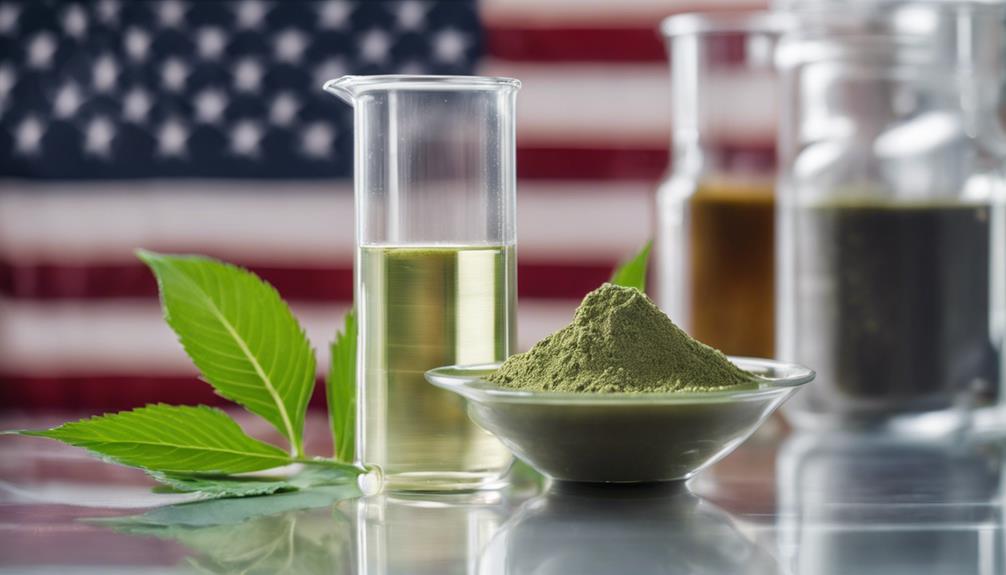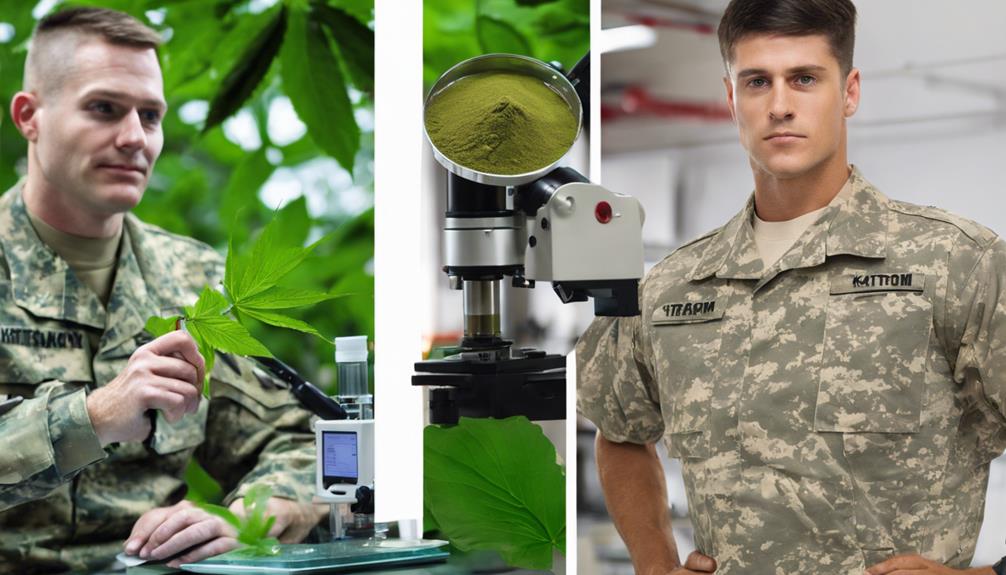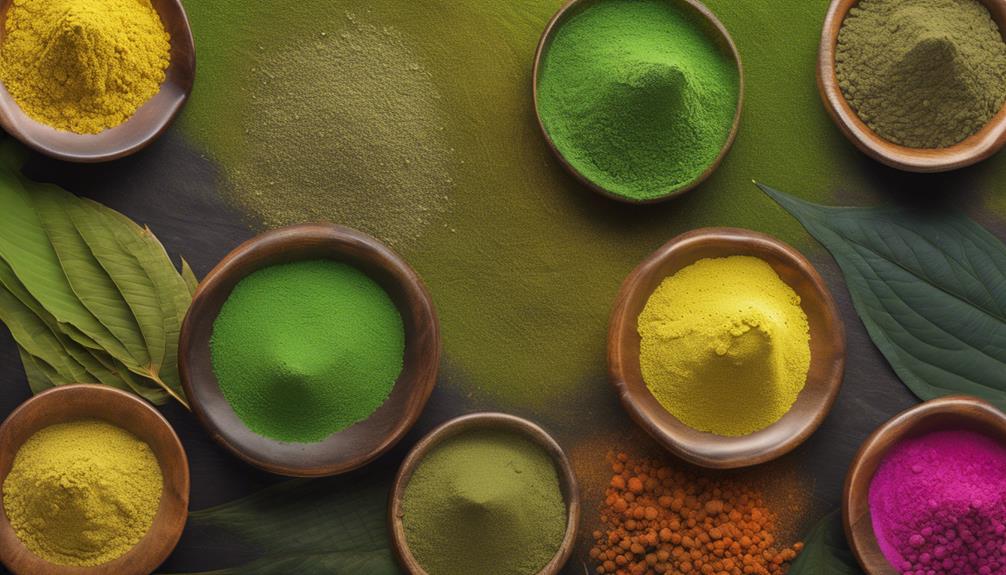As a service member, you need to know that the Army doesn't specifically test for kratom in its standard drug tests, but it's still considered a prohibited substance that can lead to disciplinary action. Although kratom alkaloids won't show up in a standard five-panel drug test, specialized tests can detect mitragynine, a kratom alkaloid, up to 6 hours after heavy usage. If caught using kratom, you'll face disciplinary action, including court-martial and possible discharge. Want to understand the Army's stance on kratom use and the risks involved?
Key Takeaways
- Kratom alkaloids won't show up in standard five-panel drug tests used by the military.
- Specialized tests can detect mitragynine, a kratom alkaloid, up to 6 hours after heavy usage.
- Urinalysis testing methods are designed to detect a range of substances, but kratom isn't specifically tested for.
- Factors affecting kratom detection include body weight, hydration levels, and individual metabolic factors.
- The Army doesn't test for kratom specifically, but prohibits its use due to potential addiction and interference with military duties.
Kratom Detection in Military Drug Tests

Since you're considering using kratom, you should be aware that, unlike other substances, it's not typically included in the standard military drug tests. This doesn't mean you're in the clear, though. While kratom alkaloids won't show up in standard five-panel drug tests, specialized tests can detect mitragynine, a kratom alkaloid, up to 6 hours after heavy usage. The United States Department of Defense has a strict stance against kratom due to its lack of FDA approval, and prohibits its use by service members. Although kratom use won't produce a positive result on a routine DoD drug test, military personnel are still prohibited from purchasing or consuming it. The prohibition aims to prevent service members from ingesting a product that could lead to drug dependency and venturing into other drugs on the controlled substance list, including opioids. So, even if kratom isn't detected in routine drug testing, it's still not worth the risk of disciplinary action.
Is Kratom Prohibited in the Military
As a service member, you should be aware that kratom is strictly prohibited in the military, classified as a drug of concern by the US military due to its lack of FDA approval. This means that using kratom is not allowed, and you're expected to adhere to this rule. The Department of Defense has a strict stance against kratom, considering it a risk to your health and well-being. Although kratom isn't part of the routine drug testing, it can be detected through specialized testing if there's a reason to suspect use. Remember, even if it's not detected by standard drug tests, it's still prohibited, and failure to comply may result in disciplinary action. As a service member, it's essential to understand the risks associated with kratom use and respect the prohibition. You're expected to prioritize your health and well-being, and kratom use is not compatible with that. Stay informed, and make responsible choices to safeguard your safety and the safety of those around you.
Army's Stance on Kratom Use

Now that you know the Army's stance on kratom use, let's examine the details of the policy. You'll want to understand the specifics of the kratom policy, including the urinalysis testing methods used to detect it, and the disciplinary action taken against service members who use it. By exploring these points, you'll gain a clearer understanding of the Army's stance on kratom use and its implications for service members.
Kratom Policy Details
When you're considering using kratom, you must understand the Army's stance on its use, as it's a complex and controversial substance that's sparked heated debates about its potential benefits and risks. In the United States, the Army has a clear policy on kratom use: it's prohibited for service members. Although kratom isn't included in the Army's standard drug testing panel, it's considered a 'drug of concern' due to its potential for abuse and addiction. The Army's Operation Supplement Safety (OPSS) program educates service members about the risks of dietary supplements, including kratom. If you're caught using kratom, you may face disciplinary action, as it's a violation of the Army's policy on substance abuse. Additionally, kratom use can compromise your fitness for duty, which is a top priority for the Army. The Army recommends avoiding kratom and other risky dietary supplements to protect your health and well-being.
Urinalysis Testing Methods
You won't find kratom on the Army's standard drug testing panel, but that doesn't mean you're in the clear if you've been using it. The Army's urinalysis testing methods are designed to detect a range of substances, and while kratom isn't specifically tested for, it's still possible to get caught.
The routine DoD drug test uses immunoassay technology to screen for various drugs, including opioids, cocaine, and marijuana. While kratom alkaloids aren't directly targeted, the test can detect the presence of certain compounds that may be similar in structure. If the initial test suggests the presence of a drug of concern, a more specific test, such as gas chromatography-mass spectrometry (GC-MS), may be used to confirm the results.
Types of drug tests, including urine and blood tests, can detect kratom use within a certain detection time. Since kratom's effects can last for several hours, it's possible to test positive even after the drug has worn off. Remember, just because kratom isn't on the standard drug test panel doesn't mean you're in the clear. The Army takes a strict stance on drug use, and even if kratom isn't directly tested for, you can still face consequences if you're caught.
Disciplinary Action Taken
If you're caught using kratom, you'll face disciplinary action, including court-martial and possible discharge, as the Army takes a strict stance on the use of this substance. As a military personnel, you're prohibited from using kratom, and failure to comply with this rule can result in severe consequences. The Army's stance is based on kratom's potential for addiction, lack of FDA approval, and its potential to interfere with your military duties and responsibilities.
You should be aware that the prohibition on kratom use applies to all Army personnel, including active-duty soldiers, reservists, and National Guard members. If you're found using kratom, you may face non-judicial punishment, administrative separation, or even court-martial. The Army's policy on kratom use is outlined in Army Regulation 600-85, which prohibits the use of kratom and other unauthorized substances. Remember, using kratom is not worth risking your military career. The Army is serious about enforcing this prohibition, and you should take it seriously too.
Types of Drug Tests for Kratom
Several types of drug tests can detect kratom use, each with its own detection window and limitations, including urine, blood, hair, and specialized tests. As someone who's curious about kratom, you might be wondering how these tests work.
Urine tests, for instance, can detect mitragynine, a kratom alkaloid, up to 6 hours after heavy usage. However, the detection window may vary depending on individual factors such as metabolism and dosage. Blood tests, on the other hand, can detect kratom in your system up to a few days after consumption, but they're rarely used due to their invasive nature and short detection window.
Hair tests, which are less common, can detect kratom use over a longer period of time, making them valuable for determining dosage recommendations and detecting chronic use. Specialized drug tests that look for mitragynine and 7-hydroxy mitragynine will automatically register positive for kratom use, but these tests are not commonly used in routine drug screenings. It's worth noting that standard drug tests, like SAMHSA-5 or NIDA, won't detect kratom alkaloids.
Factors Affecting Kratom Detection

Multiple factors, including the type of test, frequency and dosage of kratom use, body weight, hydration, and individual metabolic factors, can influence the detection of kratom in drug tests. As you consider kratom detection, vital to understand how these factors impact the outcome.
- Type of test: Urine tests detect kratom alkaloids like mitragynine up to 6 hours after heavy usage, while blood tests can detect kratom in the system up to a few days after consumption. Hair tests, on the other hand, can detect kratom use over a longer period, making it valuable for determining dosage recommendations.
- Frequency and dosage: Repeated kratom use can lead to its accumulation in the body, potentially extending the detection time. This means that your frequency and dosage of kratom use can impact how long it's detectable in your system.
- Individual factors: Your body weight, hydration, and individual metabolic factors can affect the rate of kratom metabolism and excretion, influencing the detection outcome. Understanding these factors is vital for accurate kratom detection.
Legal Implications of Kratom Detection
As you navigate the complexities of kratom detection, you must understand the legal implications, particularly if you're a military service member, since kratom use can lead to disciplinary action despite not showing up on a routine drug test. The military takes a strict stance on kratom due to its lack of FDA approval, prohibiting service members from purchasing or consuming it. Although kratom won't produce a positive result on a routine DoD drug test, you're still expected to adhere to the prohibition. Failure to comply can result in disciplinary action, emphasizing the importance of adhering to military regulations.
It's essential to prioritize your health and well-being by avoiding substance abuse, including kratom use. Education and awareness are key to preventing health risks associated with kratom consumption. As a service member, you must be aware of the legal implications of kratom detection and the potential consequences of using this prohibited substance. By understanding the legal framework surrounding kratom, you can make informed decisions that protect your career and well-being.
Does the Army Conduct Drug Tests Specifically for Kratom?
Yes, the army conducts drug tests specifically for kratom. Soldiers undergo routine screenings, and kratom is included in the panel of substances tested for. It is essential for military personnel to adhere to drug policies, and the use of kratom is prohibited. A positive kratom drug test in military can result in disciplinary action.
Kratom Policy in the US Military

Since you're now aware of the legal implications of kratom detection, understand that the specific policies surrounding kratom use in the US military are crucial. The Department of Defense has a strict stance against kratom, and its use is prohibited for all service members. Note the following key points:
- Prohibited substance: Kratom has been added to the Operation Supplement Safety list of prohibited substances, and military personnel are advised to avoid using any products containing kratom.
- Drug policy violation: Kratom use is considered a violation of the Department of Defense's drug policy, and service members found to be using kratom can face disciplinary action, including court-martial.
- Health and well-being: The prohibition on kratom in the military is aimed at preventing service members from ingesting a product that could lead to drug dependency and compromise their health and well-being.
As a member of the United States military, recognize that kratom use is not tolerated and can have serious consequences. The military's strict stance on kratom is in place to protect service members and maintain the high standards of the US military.
Frequently Asked Questions
Is Kratom Legal in Florida?
As you wonder if kratom is legal in Florida, here's the lowdown: it is. Florida laws don't prohibit kratom, allowing you to buy and use it as an herbal supplement. However, be aware that local ordinances might vary. As a Florida resident, you're free to explore kratom usage, but remember that state regulations and drug policies can change. Stay informed to verify you're on the right side of the law.










